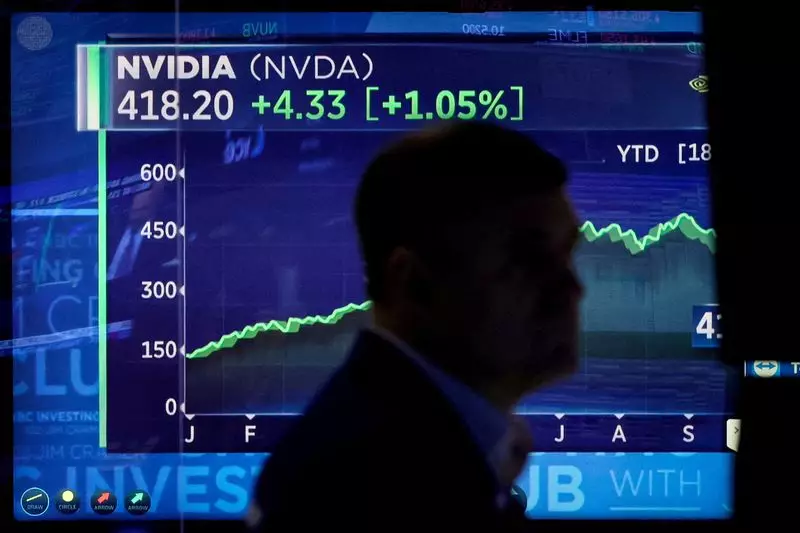The prospect of impending U.S. interest rate cuts is causing a stir among investors, who now find themselves at a crossroads. The dilemma they face is whether to maintain their allegiance to the stalwart Big Tech stocks that have been the backbone of market returns for an extended period, or to pivot towards lesser-loved sectors that could stand to gain from the loosening of monetary policy. The dominance of massive tech and growth companies like Nvidia, Microsoft, and Amazon has paid off handsomely for investors since early 2023. However, this period of sustained success has raised concerns, with some drawing parallels to the dot-com bubble of the late 1990s. The narrative surrounding these tech giants may soon shift, following the unveiling of a surprisingly subdued inflation report on Thursday. The report solidified expectations of an imminent interest rate cut by the Federal Reserve, a move that could herald a new era for sectors that have lagged behind this year, such as small-caps, real estate, and industrials.
Market dynamics at the end of the week indicated that a nascent transformation may already be underway. The tech-heavy Nasdaq 100 experienced its most significant drop of the year on Thursday, juxtaposed by the small-cap Russell 2000 enjoying its best performance of 2024. While the Nasdaq 100 has surged by approximately 21% this year, the Russell 2000 has recorded a more modest 6% increase. Furthermore, the equal-weight S&P 500, which represents the average stock in the index, outperformed the conventional market-weighted S&P 500 on Thursday. These developments have started to chip away at the significant advantage held by the S&P 500, which remains up by about 18% in 2024 in comparison to a 6.7% gain for the equal-weight index. Walter Todd, Chief Investment Officer at Greenwood Capital, acknowledges this shift, stating, “The trade got too one-sided, and we’re seeing some reversal of this.”
These changing dynamics have sparked cautious optimism amongst investors. One factor underpinning this newfound hope is the increasing likelihood of a rate cut. Fed fund futures are currently pricing in a nearly 90% probability of a 25 basis point reduction at the central bank’s September meeting. Industries that heavily rely on credit, such as smaller companies and biotech firms, are expected to benefit the most from lower rates. According to Matthew McAleer, President and Director of Private Wealth at Cumberland Advisors, industrial companies engaged in capital-intensive projects may also reap the rewards of reduced borrowing costs. As bond yields continue to decline in response to lower rates being factored in by traders, equity valuations across various market segments stand to become more appealing. Lower yields translate to less competition from the bond market for equities, thereby enhancing stock valuations in the eyes of many analysts.
Despite the resurgence of interest in sectors that have historically been overshadowed by Big Tech, skepticism remains regarding a sustained shift away from megacap companies. The resilience demonstrated by megacap stocks, particularly in uncertain economic climates, could see investors gravitating back towards them if economic weakness surpasses expectations. Chuck Carlson, Chief Executive Officer at Horizon Investment Services, believes that should the U.S. economy falter significantly after a prolonged period of heightened interest rates, Big Tech stocks could emerge as a safe harbor for investors. Moreover, the pervasive influence of the artificial intelligence theme, centered around megacap tech stocks, has continued to captivate investors. Rick Meckler, Partner at Cherry Lane Investments, acknowledges this, suggesting that as long as the AI narrative remains dominant, it will be challenging for these stocks to experience substantial declines.
However, any sustained exodus from megacap stocks could spell trouble due to their substantial weightings in major indexes. The concentration of year-to-date gains in stocks like Nvidia and Microsoft within the S&P 500 could prove detrimental should these tech behemoths experience a downturn. Matthew Maley, Chief Market Strategist at Miller Tabak, issued a warning in this regard, pointing out that a continued decline in large-cap tech stocks could trigger a broader market correction. Consequently, while the landscape of the market appears to be shifting amidst expectations of interest rate cuts, investors must tread cautiously and consider a balanced approach to their investment strategy to navigate the uncertainty ahead.

